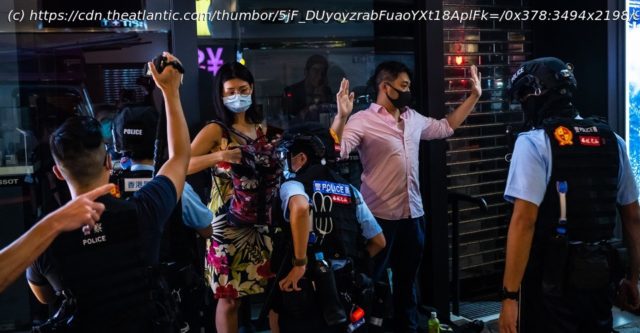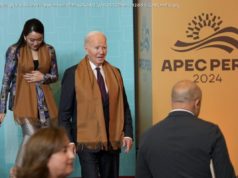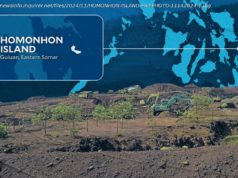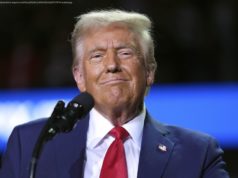In Hong Kong and around the world, public-health concerns are being used to excuse extraordinary overreach.
This month, two young men stood outside a high-end Hong Kong shopping mall, clutching bouquets of white flowers as they held a memorial for a protester who had died nearby last year. The event, like any marking the milestones or memories of the prodemocracy movement, drew police attention; more than a dozen gathered to keep watch, one holding a video camera to record the events. When a passerby stopped to join the pair, police stepped in. The city’s social-distancing regulations stipulate that gatherings must be limited to two people, so the officers surrounded the mourners to question them before handing them tickets for breaking the rules. Just one day earlier, a humid Friday evening, an after-work crowd had gathered in a trendy district of the city, lining the street for happy-hour drinks, unbothered by police. Some congregated outside a corner 7-Eleven to buy cans of beer, with images showing groups well above the allowed number. The double standard was not a one-off. When Roy Tam and a group of fellow prodemocracy district councilors organized a media event to criticize the Hong Kong government’s pandemic testing plan last week, they took precautions to make sure they were not breaking the rules. The group wore masks, stood in groups of two, and distanced themselves from one another in front of a sports center that the government is converting into a testing center. Those efforts, and the fact that they were elected officials, didn’t satisfy the police. Officers quickly converged on the group, cordoned off with bright-orange tape the small gaggle of media that had come to cover the event, and began doling out fines. Tam wasn’t surprised. Since regulations were introduced this year, they have been “more strict for the prodemocracy protesters,” he told me. Another prodemocracy politician was recently fined while handing out free masks to city residents. “They are using this law politically to suppress the freedom of assembly in Hong Kong,” Tam said. Though the coronavirus has posed an enormous challenge for world leaders, it has also presented an opportunity—for those who wish to consolidate power, pandemic containment rules offer a convenient tool to stifle inconvenient dissent. Here in Hong Kong, for example, the city’s chief executive, Carrie Lam, postponed legislative elections scheduled for September by an entire year, sapping momentum from a prodemocracy camp that looked poised to make sizable gains. (Lam has said that the move was not at all political and based solely on public-health concerns, but given the wide-ranging crackdown in the city over the past year, few have bought that justification.) Lam’s decision has also deepened a rift among serving prodemocracy lawmakers, and risks fragmenting a group that put aside long-held differences in opposition to Lam last year. Hong Kong is hardly the only place where the pandemic has proved to be useful political cover. In Israel,Prime Minister Benjamin Netanyahu used the public-health crisis to shut down the country’s Parliament and judiciary—which enabled the prime minister to not only postpone his own corruption trial, but also authorize the security service to track citizens’ movements using cellphone data without legislative oversight. In Bolivia, a forthcoming general election has been twice delayed because of the pandemic—an excuse that opposition parties allege has allowed the country’s interim president to extend her rule. Poland did manage to hold presidential elections last month, but the ruling Law and Justice Party leveraged the crisis to its advantage by banning public events, making campaigning all but impossible.






